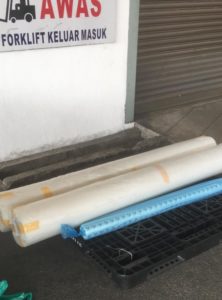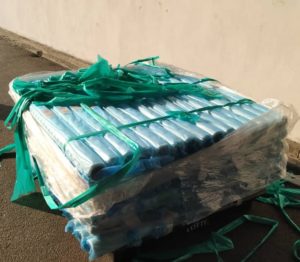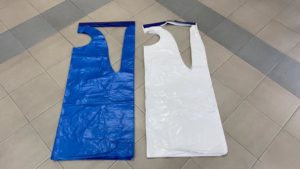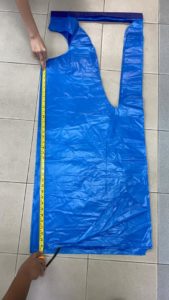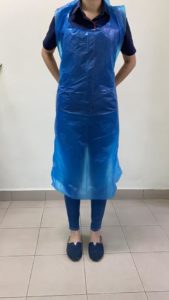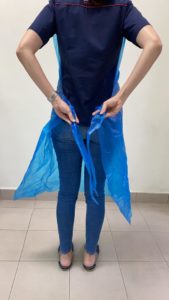PLASTICS MAKERS GIVE CRITICAL DISPOSABLES TO HOSPITALS AMID SHORTAGE OF PPES
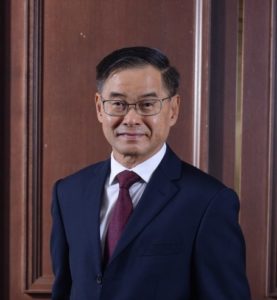
KUALA LUMPUR, 23 March 2020: PLASTICS manufacturers are stepping up to donate and supply hospitals and their frontliners with plastic items to respond to the shortage of personal protective equipment (PPE) due to the widespread Covid-19 outbreak.
The Malaysian Plastics Manufacturers Association (MPMA) has organised a donation drive among its members, calling on them to give what they can to hospitals facing shortages of disposables, including mineral water, face shields, aprons, gowns, shoe or ankle covers, bottles and goggles.
MPMA members have already donated 15,000 plastic aprons for doctors, nurses and hospital staff to use and will be donating more in days to come.
“We are looking at sourcing longer plastic aprons that are better-suited for medical frontliners. In the meantime, our members are providing plastic sheeting for the frontliners to repurpose as they need,” said Datuk Lim Kok Boon, MPMA’s president.
The donated plastic sheeting can be used as temporary barriers or curtains in the hospitals, as well as disposable protective covering for medical staff.
“As plastics is a critical sector, we are determined to do whatever we can to help the nation’s fight against the Covid-19 outbreak,” Lim said. “We must protect the frontliners in our battle against this disease.”
PROTASCO POSTS FULL YEAR TURNAROUND ON RIGHT-SIZING EXERCISE
KAJANG, 27 February 2020: Protasco Berhad recorded a fourth straight quarter of profit and returned to the black with a full-year net profit of RM19.1 million despite a lower revenue for the financial year ended 31 December 2019.
The Maintenance, Construction, Property, Trading and Education business segments recorded improvement in its financial performance and contributed to the full-year Group pre-tax profit of RM34.6 million in 2019 against a pre-tax loss of RM23.9 million in the previous financial year. This favourable result was achieved despite lower revenue of RM823.6 million in the current financial year as compared to RM904.9 million in the previous financial year.
Profit after tax for the quarter is RM5.9 million as compared to a loss after tax of RM42.1 million recorded in the preceding corresponding quarter.
The Group’s current quarter and full-year favourable financial performance revealed the continuing positive impact of its right-sizing exercise which includes cost optimisation efforts that generated better margins.
“This turnaround is proof that our hard work is paying off and we hope to carry this positive momentum for the long term. We want to capitalise on our fundamentals and ensure a sustainable footing for the long run, so that we could give our best to our stakeholders,” said Dato’ Ir Kenny Chong Ther Nen, Protasco’s newly appointed Group Managing Director.
Protasco’s revenue for the fourth quarter, however, slid by 10 percent to RM242.2 million resulting in a lower full-year revenue of RM823.6 million as compared to RM904.9 million in the previous financial year due to lower contributions received from the Perumahan Penjawat Awam (“PPA”) Phase 2 Project under its Construction business segment which is expected to be completed by early second quarter 2020.
The construction of its solar plant in Melaka has commenced and is expected to be completed in the fourth quarter of 2020. Upon completion, it will immediately begin commissioning electricity to Tenaga National Berhad (“TNB”). It is expected to contribute positively to the Group’s earnings. Protasco through its subsidiary I2 Solarpark One Sdn Bhd has a 21-year power purchase agreement with TNB.
BETTER MARGINS PUSH DAMANSARA REALTY’S 2019 PROFIT HIGHER BY 19.3 PERCENT
BETTER MARGINS PUSH DAMANSARA REALTY’S 2019 PROFIT HIGHER BY 19.3 PERCENT
KUALA LUMPUR, 19 February 2020 – Damansara Realty Berhad (DBhd) saw its 2019 full year net profit jump 19.3 percent to RM23.3 million and its pre-tax profit rise 7.6 percent to RM27.3 million.
The Group’s improved performance resulted from higher Integrated Facilities Management (IFM) projects margin, sales of its Aliff Square 2 (AS2) commercial units as well as contributions from its joint venture with Country Garden for Central Park development in Johor Bahru.
“This performance is evidence that DBhd is progressing towards high-growth & better-margin projects despite lower revenue recorded last year,” said DBhd’s Group Managing Director, Ts. Brian Iskandar Zulkarim.”
DBhd Group fourth quarter revenue has increased by 7.2 percent to RM88.2 million compared to the same quarter in the preceding year. Net profit stood at RM13.5 million and pre-tax profit at RM14.8 million.
“We are seeing positive results from our strategic alliances, especially for our property development segment.” We have also continued to expand these alliances from our partnership with Active Estates for the development of 68 Commercial Units at Business Boulevard Central Park JB worth more than RM156 million,” he added.
DBhd also partnered with Menteri Besar Negeri Sembilan Incorporated (MBNSI) to jointly develop a mixed-development project Bandar Sri Sendayan, Negeri Sembilan worth more than RM770 million. With planning underway, DBhd is looking to break ground within the Q2 of 2020. This 50-acre commercial plot is to be developed over the next 5 to 10 years.
“In 2020, we are doubling our efforts to explore more opportunities in the IFM segment. We believe that our strategy in improving the quality of our contracts through technology adaptation and innovation will bear fruits soon,” Ts. Brian said.
“This includes the Metro Parking Group (MPG) implementing its in-house cashless and automated system to improve long-term business efficiency and margins.”
Earlier in 2019, the MPG through its subsidiary, Metro Parking Philippines (MPP) was awarded a RM62 million contract to develop and manage various parking facilities in Madrigal Business District, Manila.
The Singapore Operations via Metro Parking Singapore (MPS) also reported a positive result in 2019 following a major transformation exercise aimed at bringing it back to profitability, led by its newly appointed Managing Director, Mohd Afiq Farhan Bin Md Hanif, who is one of the talents in the Group’s succession planning programme.
*Ts. stands for the title of ‘Professional Technologist’ awarded by the Malaysia Board of Technologists (MBOT).
EKONOMI MALAYSIA PERLU SUNTIKAN TUNAI SEGERA UNTUK IMBANG KESAN BURUK COVID-19
KOMENTAR, 20 Mac — Kerajaan perlu memberikan wang tunai kepada rakyat segera, kalau boleh sekarang juga.
Tindakan pertama yang kerajaan perlu ambil adalah membekukan Potongan Cukai Bulanan (PCB) daripada gaji dan juga bayaran CP204, iaitu cukai terdahulu yang dibayar oleh perniagaan. Selanjutnya, kerajaan memulangkan semula potongan PCB and bayaran CP204 sepanjang 12 bulan yang lepas.
Ini boleh dilaksanakan serta-merta kerana ia berada dalam kemampuan kerajaan. Tidak perlu isi borang atau penuhi sebarang syarat. Hanya tekan butang dan kembalikan tunai kepada semua orang yang telah dikenakan potongan itu, terutamanya kepada golongan yang memerlukannya sekarang.
Mengembalikan semula potongan cukai dengan memasukkan terus ke dalam akaun bank golongan pekerja akan membolehkan mereka menanggung keperluan anak serta ibu bapa yang uzur, dan membeli keperluan harian.
Mengembalikan potongan CP204 pula akan membolehkan peniaga membayar gaji harian dan bulanan pekerja mereka, dan membayar pembekal supaya pembekal itu pula boleh membayar gaji harian dan bulanan pekerja mereka serta pembekal mereka.
Inil adalah satu cara untuk mengelakkan kesan “cash crunch” (keruntuhan tunai) yang bakal berlaku nanti. Pakej stimulus pertama RM20 bilion yang diumumkan oleh bekas Perdana Menteri Tun Dr Mahathir Mohamad memang memadai jika tiada krisis wabak ini.
Sebaliknya, pakej stimulus kedua bernilai beberapa bilion ringgit yang diumumkan oleh Perdana Menteri Tan Sri Muhyiddin Yassin memang tidak mencukupi. Ini adalah kerana Perintah Kawalan Pergerakan kerajaan untuk dua minggu ini telah mengubah segala-galanya.
Yang paling penting buat masa ini adalah untuk kerajaan tidak menarik keluar wang daripada ekonomi dan daripada poket peniaga. Wang tunai ini perlu kekal dalam ekonomi dan digunakan untuk memastikan survival rakyat. Jangan mudah meneirma nasihat orang yang mengaku “pakar” yang menolak tindakan ini kononnya kerana takut dengan hutang negara.
Tanpa suntikan tunai, ekonomi negara akan menyaksikan kemuflisan dan keruntuhan sektor perniagaan. Ramai peniaga kecil akan gulung tikar dan golongan yang bergantung kepada mereka akan terjejas teruk – seperti penjaja yang menggajikan pencuci pinggan, dan perniagaan kecil yang membayar abang dispatch, kakak pencuci dan uncle suratkhabar.
Selain itu, kerajaan patut menaikkan gaji petugas barisan hadapan, terutamanya mereka yang berpendapatan rendah. Pekerja dan petugas barisan hadapan perlu dibayar lebih — polis, bomba, paramedik, jururawat, pembantu hospital.
Ini bukan masanya untuk bercakap tentang sumber pendapatan kerajaan, bon 1MDB, defisit belanjawan kerajaan. Yang patut kerajaan lakukan sekarang ialah menyakinkan rakyat bahawa anda tahu apa yang anda laksanakan demi rakyat. Dan tunjukkan bahawa anda tahu apa yang ekonomi perlukan, iaitu suntikan tunai segera.
Jangan risau sama ada kerajaan mampu atau tidak. Kerajaan perlu tegas dan memahami kata-kata Penerima Hadiah Nobel dan pakar ekonomi Joseph Stiglitz: “Apabila Amerika Syarikat diserang dalam Perang Dunia Kedua, tiada siapa yang bertanya ‘mampukah kita berperang?’ Ini soal hidup mati kita. Kita tiada pilihan, kita terpaksa berjuang dalam peperangan itu.”
Apakah peranan sebenar kerajaan jika bukan untuk berkhidmat demi rakyat, terutama dalam masa yang amat genting ini? Apa guna rakyat dan peniaga membayar cukai jika pemimpin takut untuk bergerak dan berjuang demi kebajikan, keselamatan dan kepentingan rakyat.
Memang kita penting kita jaga kita tetapi kerajaan harus memainkan peranan utama untuk menjaga kita semua.
* Lee Siew Lian adalah seorang usahawan komunikasi yang turut membaca Malay Mail.
DAMANSARA REALTY UNVEILS BUSINESS BOULEVARD @ CENTRAL PARK
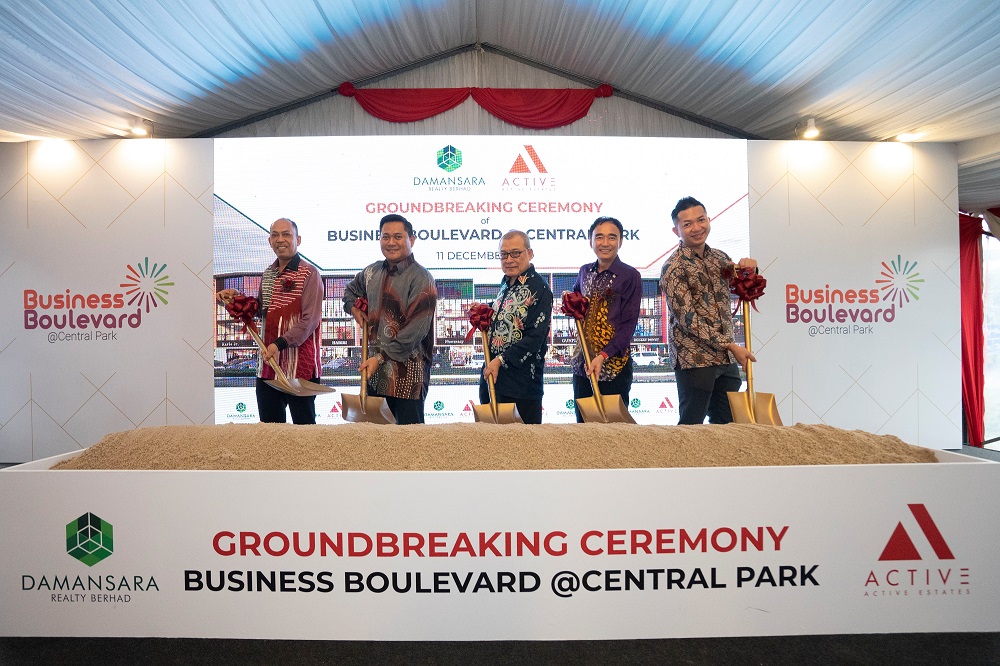
(From left to right) Azhari Abdul Hamid, Group Executive Director of Damansara Realty Berhad; Ts. Brian Iskandar Zulkarim, Group Managing Director of Damansara Realty Berhad; Dato’ Ahmad Zahri Jamil, Chairman of Damansara Realty Berhad; Teo Chee Yow, Group Managing Director of Active Group and Isaac Tan Sze Yen, Deputy General Manager of Active Group.
KUALA LUMPUR, 11 December 2019: Damansara Realty Berhad (DBhd), through its subsidiary, DAC Land Sdn. Bhd, and Johor-based partner, Active Estates Sdn. Bhd. has launched Business Boulevard @ Central Park, set to be its latest commercial development in Tampoi, Johor Bahru.
Business Boulevard @ Central Park, worth an estimated gross development value (GDV) of more than RM150 million, is the third instalment of Aliff Square and will comprise 68 units of freehold commercial shop-office lots to be developed in four phases over the next five years.
This 6.9-acre development will cater to the existing waiting list of interested buyers following the success of DBhd’s Aliff Square 1 & 2 developed in the same area.
“Now that Aliff Square 1 and 2 are fully sold, we’ve proven our ability to design and build properties that meet current trends and buyers’ demands. Leveraging on Taman Damansara Aliff’s strategic location and excellent connectivity, we expect Business Boulevard @ Central Park to build on this success,” said DBhd’s Group Managing Director, Ts. Brian Iskandar Zulkarim.
“Seeing the high demand from our registered list of interested buyers for such units in the area, we are optimistic with the allure of this development to the potential business owners and investors,” said Ts. Brian at the ground-breaking ceremony today.
This strategic alliance is part of DBhd’s expansion strategy. In October 2019, DBhd and its joint venture partner Country Garden launched Phase Three of their joint development project Central Park at Persiaran Aliff Harmoni Utama, Johor Bahru. Phase Three Central Park will spread over 14.7 acres of land, comprising of 216 double-storey terrace units.
Additionally, DBhd’s joint development project with state investment arm, Menteri Besar Negeri Sembilan Incorporation (MBNSI), for a 50-acre commercial land in Sendayan is expected to start sometime in Q1 of 2020.
“Strategic alliances have always been a key enabler to DBhd’s growth and has always been part of our long-term strategy. By combining strength and capabilities with established partners such as Active Estates, we are able to operate more efficiently with minimal capital expenditure, producing better quality earnings and pushing DBhd closer to our 2019 financial goals.” Ts. Brian added.
*Ts. stands for the title of ‘Professional Technologist’ awarded by the Malaysia Board of Technologists (MBOT).
PROTASCO’S NET PROFIT SURGES ALMOST THREE TIMES AS COST OPTIMISATION EXERCISE CONTINUES
PROTASCO’S NET PROFIT SURGES ALMOST THREE TIMES AS COST OPTIMISATION EXERCISE CONTINUES
KAJANG, 27 NOVEMBER 2019: Protasco Berhad saw its nine-month net profit nearly triple to RM13.1 million from RM4.5 million for the year ending 31 December 2019.
The Group’s pre-tax profit for the nine months surged by 71.3 percent to RM27.5 million despite a dip of 8.4 percent in revenue to RM581.4 million. This performance arose from the group’s continuing cost optimization and right sizing exercise, especially in the Construction and Education segment.
“We expect this turnaround to continue gathering momentum and we are confident that we will return to full profitability in this financial year,” said Dato’ Sri Ir Chong Ket Pen, Executive Vice Chairman and Group Managing Director.
The cost optimization exercise, which was initiated in 2018, has continued to drive improved results at the Group.
Meanwhile, Protasco’s Clean Energy business will commence works on its solar plant in Melaka, which is expected to contribute positively to the future earnings and net assets of the Group.
For the third quarter, Protasco’s net profit rose by 24 percent to RM4.5 million from RM3.6 million in the same period last year, while pre-tax profit increased by 18.1 percent to RM9.8 million, on the back of a marginal 3.6 percent dip in revenue to RM226.5 million from RM234.9 million in the same period last year.
Protasco’s construction segment was the main contributor to the Group revenue in the third quarter, posting a 35 percent jump to RM109.3 million, arising from the ongoing Perumahan Penjawat Awam (PPA) Phase 2 project in Putrajaya.
Compared to the second quarter, revenue in the third quarter was higher at RM226.5 million due to an increase in periodic works awarded to the Maintenance segment. Its Education segment also saw improvement in revenue from a higher student intake.
SECRET DUMPING POLLUTES THE ENVIRONMENT AND CREATES A HAZARD TO OUR HEALTH
SECRET DUMPING POLLUTES THE ENVIRONMENT AND CREATES A HAZARD TO OUR HEALTH
The illegal dump in Kampung Tambak Jawa, Selangor, where drums of hazardous chemicals caught fire and exploded on November 25, is an alarming indication of the rising occurrence of secret and illegal disposal of waste. Earlier this month, 250 drums of glycerin were found dumped on the banks of the Klang River.
Illegal dumps, whether of household rubbish or hazard chemicals, are a threat to the environment and to human health, representing a serious leakage from the waste management system, and the source of pollution in the rivers, seas and oceans.
Waste management authorities need to heighten their enforcement of proper disposal of waste, especially hazardous chemicals. The rising number of reports of illegal dumping is of great concern because whether into rivers or on idle land, illegal dumping threatens the environment and, in the long term, our health and safety. It also costs money, in the form of clean-ups or healthcare, or even a drop in the value of property in the vicinity. Ultimately, the bulk of this cost is borne by the public, either as taxpayers or customers.
In order to reduce illegal dumping, the authorities must examine and understand where and why such leakage occurs, and address the gaps in order to create an effective waste management for Malaysia. To do this requires wider collaboration among all parties involved from regulators to business and industry and to consumers and households.
Regulators are not limited to the National Solid Waste Management Department and the Department of Environment, but include local authorities in every state as well as the Department of Irrigation and Drainage.
Illegal dumping is driven by economic incentives and convenience, and the absence of punishment, or ineffective enforcement, as was demonstrated earlier this year with the “sampah plastik” issue. Illegal dumping, like littering, is also a behavioural issue which cannot be addressed through blanket bans. It must be addressed as an infrastructure and system design issue and not just as an enforcement issue.
Addressing and preventing illegal dumping and littering, like the “sampah plastik” issue, will require a problem-solving approach, rather than knee-jerk measures like blanket bans. Careful analysis must be applied to identify the right measure or policy intervention in the design of an effective waste management system, preventing pollution and protecting the environment.
These include economic and social incentives to facilitate and promote behaviour change, and not just physical facilities. We also need a multi-stakeholder collaboration from all parties across the value chain from Government, brand owners, retailers, NGOs and consumers and industry.
Illegal dumping and litter are sources of environmental pollution, be it on land or at sea. MPMA has advocated the proper disposal of rubbish and waste under our “Don’t be a Litterbug” campaigns “Use a Bin” programme since 2012.
We need to continue our education efforts on a proper waste disposal, practising the 3Rs (Reduce, Reuse and Recycle) and more urgently we need to work towards establishing an advanced plastics recycling industry for Malaysia.
Recycling is a core component of an effective waste management system and plays a vital role in protecting the environment. It is the key element of Circular Economy, a system that moves away from the old “take-make-use-throw” progression. In a circular economy, waste becomes a valuable resource, to be recycled as raw material, made into new products and not thrown away. This reduces the need to extract more natural resources and the impact on the environment.
MPMA and MPRA are committed to developing a clean, vibrant and healthy plastics recycling industry that would boost the country’s recycling rate and contribute to a cleaner, greener Malaysia. But we cannot do this alone.
MPMA & MPRA
26 NOVEMBER 2019
ILLEGAL DUMPING IS AN ECONOMIC AND BEHAVIOURAL ISSUE
ILLEGAL DUMPING IS AN ECONOMIC AND BEHAVIOURAL ISSUE
Recent incidents of illegal dumping of rubbish and even potentially hazardous chemicals into the Klang River have put the spotlight on the issue of gaps and weaknesses in Malaysia’s waste management system. Two weeks ago, a lorry was recorded dumping household rubbish into the river, and days later 250 drums of glycerin were found on the river bank.
More recently, a local academic posted a video over the weekend showing that illegal dumping has continued at a known site in a forest in Gombak even after local authorities were notified, and after the Gombak Works Department said it would seal off this and nine other illegal dumpsites in the area.
This secret and illegal disposal of waste of all types is a serious leakage from the waste management system, and the source of pollution in the rivers, seas and oceans.
Illegal dumping, whether into rivers or on idle land, threatens the environment and, in the long term, our health and safety. It also costs money, in the form of clean-ups or healthcare, or even a drop in the value of property in the vicinity. Ultimately, the bulk of this cost is borne by the public, either as taxpayers or customers.
In order to reduce illegal dumping, the authorities must examine and understand where and why such leakage occurs, and address the gaps in order to create an effective waste management for Malaysia. To do this requires wider collaboration among all parties involved from regulators to business and industry and to consumers and households.
Regulators are not limited to the National Solid Waste Management Department and the Department of Environment, but include local authorities in every state as well as the Department of Irrigation and Drainage.
Illegal dumping is driven by economic incentives and convenience, and the absence of punishment, or ineffective enforcement, as was demonstrated earlier this year with the “sampah plastik” issue. Illegal dumping, like littering, is also a behavioural issue which cannot be addressed through blanket bans. It must be addressed as an infrastructure and system design issue and not just as an enforcement issue.
Addressing and preventing illegal dumping and littering, like the “sampah plastik” issue, will require a problem-solving approach, rather than knee-jerk measures like blanket bans. Careful analysis must be applied to identify the right measure or policy intervention in the design of an effective waste management system, preventing pollution and protecting the environment.
These include economic and social incentives to facilitate and promote behaviour change, and not just physical facilities. We also need a multi-stakeholder collaboration from all parties across the value chain from Government, brand owners, retailers, NGOs and consumers and industry.
Illegal dumping and litter are sources of environmental pollution, be it on land or at sea. MPMA has advocated the proper disposal of rubbish and waste under our “Don’t be a Litterbug” campaigns “Use a Bin” programme since 2012.
We need to continue our education efforts on a proper waste disposal, practising the 3Rs (Reduce, Reuse and Recycle) and more urgently we need to work towards establishing an advanced plastics recycling industry for Malaysia.
Recycling is a core component of an effective waste management system and plays a vital role in protecting the environment. It is the key element of Circular Economy, a system that moves away from the old “take-make-use-throw” progression. In a circular economy, waste becomes a valuable resource, to be recycled as raw material, made into new products and not thrown away. This reduces the need to extract more natural resources and the impact on the environment.
MPMA and MPRA are committed to developing a clean, vibrant and healthy plastics recycling industry that would boost the country’s recycling rate and contribute to a cleaner, greener Malaysia. But we cannot do this alone.
MPMA & MPRA
18 NOVEMBER 2019
MALAYSIA BRINGS TOGETHER PLASTICS INDUSTRIES FROM ASIAN REGION TO PROMOTE CIRCULAR ECONOMY
MALAYSIA BRINGS TOGETHER PLASTICS INDUSTRIES FROM ASIAN REGION TO PROMOTE CIRCULAR ECONOMY
PETALING JAYA, 15 November 2019: Fighting litter and preventing plastics from entering the environment is a joint effort by the plastics industry working together with governments, brand owners, consumers and communities, leaders of Asia’s plastics industry chimed at the 18th Term Conference of the ASEAN Federation of Plastics Industries (AFPI) and the 29th Asia Plastics Forum (APF).
“Litter remains the most pressing problem as a source of plastic waste and pollution and must be addressed as part of Asian countries’ efforts to develop a Circular Economy and a New Plastics Economy,” said APF secretary-general, Callum Chen.
“There simply is no technology to address littering. It is behavioural change that is needed to make the difference. The plastics industry alone cannot solve littering. It requires Government, environment groups, NGOs all coming together alongside the industry,” he added.
Some 50 industry leaders and experts from Asia’s plastics industry gathered today at the annual conference. Hosted by Malaysian Plastics Manufacturers Association (MPMA) who acts as the secretariat of APF and recently assumed its role as the Chairman of AFPI in September 2019, the conference was officiated by YB Dr Ong Kian Ming, Deputy Minister of the Ministry of International Trade, and Industry (MITI).
“This platform is a necessary initiative to empower the local industry and motivate the industry players, particularly small-to-medium sized enterprises (SMEs) to remain aware of the current challenges and help them in assessing their capabilities and readiness to compete on a global scale. This is particularly important amidst growing consumer preference for sustainable solutions that can address concern for single use plastics,” said YB Dr Ong Kian Ming.
Every year, the AFPI Conference is held in conjunction with the APF and is rotated amongst 12 countries. Themed “Building a resilient and innovative plastics industry” this year, the participants explored new trends in plastics waste management and business opportunities in the circular economy.
They also discussed how to innovate in order to develop a New Plastics Economy and were briefed on the establishment of the Malaysian Plastics Pact and multi-stakeholder collaborations.
“ASEAN economies must be able to participate in these megatrends if their futures are to be assured. Threats to the value of labour, skills sets, foreign direct investments, income and wealth distribution and ultimately governance systems are growing, and likely to become more critical in the future,” said Datuk Lim Kok Boon, AFPI Chairman and MPMA President.
“As an Asian regional group, we need to emphasise the importance of a circular economy and collaboration between our member countries. This regenerative approach, in contrast to the linear economy of “take-make-use-throw” system, requires the participation of all the parties in the entire chain,” he added
“Recycling is the key element of the Circular Economy. Together with Malaysian Plastics Recycling Association (MPRA), MPMA has committed to developing a clean, vibrant and healthy plastics recycling industry that would create a new engine of growth for employment and a dynamic export sector,” added Datuk Lim.
To achieve this long-term target, MPMA and MPRA in collaboration with Monash University Malaysia had published a White Paper on Advanced Plastics Recycling Industry for Malaysia. Launched recently in October 2019, the White Paper suggests for all stakeholders to have further discussions and consultations to advance and modernise the plastics recycling sector.
The AFPI conference was attended by government officials and key players across the supply chain from the 12 APF member countries, namely Bangladesh, China, India, Indonesia, Japan, Myanmar, Philippines, Singapore, Sri Langka, Thailand, Vietnam and Malaysia.
MPMA, CHEVRON PHILLIPS CHEMICAL, KDEB WASTE MANAGEMENT, TZU CHI MALAYSIA CONTINUES DRIVING MARINE LITTER AND POLLUTION AWARENESS IN CLEAN UP WITH COMMUNITY OF BAGAN HAILAM
Photo 1: The community of Bagan Hailam working together to clean up the designated area in the fishing village at the Bagan Hailam Cleanup Programme 2019, jointly sponsored by Malaysian Plastics Manufacturers Association (MPMA), Kumpulan Darul Ehsan Berhad (KDEB) Waste Management Sdn Bhd, Chevron Phillips Chemical Malaysia and Tzu-Chi Malaysia.
Photo 2 & 3: Before and after photos of the designated clean up area in Bagan Hailam
KLANG, 3 NOVEMBER 2019: The Malaysian Plastics Manufacturers Association (MPMA) has taken its campaign to raise awareness on marine litter and pollution to the century-old fishing village of Bagan Hailam, Selangor, clearing 2.5 tonnes of litter in a hot-spot area that was strewn with rubbish.
The Bagan Hailam Cleanup Programme 2019 brought together Kumpulan Darul Ehsan Berhad (KDEB) Waste Management Sdn Bhd, Chevron Phillips Chemical Malaysia, Tzu-Chi Malaysia and MPMA. The Programme Partners working together with the community, spent the better half of the morning clearing the hot spot.
“Marine litter and pollution is a result of ineffective waste management and lack of civic awareness. We want to change this by putting a stop to the behavioural problem that is littering and keep the community informed on proper ways in managing their waste,” said MPMA Vice President, Dato’ Raymond Sng.
The 2.5 tonnes of rubbish was largely contaminated waste which was taken by KDEB Waste Management to the Jeram sanitary landfill.
The clean up event is part of a longer-term effort to empower the residents of Bagan Hailam to address improper waste disposal, and raise awareness on marine litter and the importance of preventing pollution in the rivers and marine environment.
Joint sponsor KDEB Waste Management will be providing leach bins at specific locations in Bagan Hailam to encourage the proper disposal of waste, which will reduce marine litter and mismanaged plastics waste. Meanwhile, volunteers from Tzu-Chi will continue to hold a recycling day once a month in the area where they have been since 2016.
“Education and raising awareness is key in changing behaviour and KDEB is pleased to collaborate with MPMA, Chevron Phillips and Tzu Chi for Bagan Hailam. This clean up is part of KDEB’s ongoing efforts since 2017 to spread awareness in targeted communities who may be less informed on the 3Rs (Reduce, Reuse and Recycle),” said Puan Mahfuzah Binti Muhamad Tarmidi, Head of Media and Public Relation.
Since 2018, MPMA has initiated beach cleanup activities in several locations across the country as part of The International Coastal Cleanup movement, a programme initiated by Ocean Conservancy, a non-profit environmental advocacy group based in the United States.
In November last year, MPMA had collaborated with Tzu Chi to complete a month long clean up programme with the resident of Sungai Satu, Pulau Ketam, a small fishing village located off the coast near Port Klang which saw an outstanding 9,860 kg of waste collected out of which 800 kg are recyclables that could have been sent to the landfills.
“There needs to be a civic consciousness to handle waste properly and send recyclables to the right place, not misdirected to the landfills. We need to stop the litterbug habits, do our part in supporting an efficient waste management system, in order to build a cleaner and greener Malaysia. I hope that this clean up effort carries on and Bagan Hailam will restore its village beauty and attractions,” Sng concluded.

